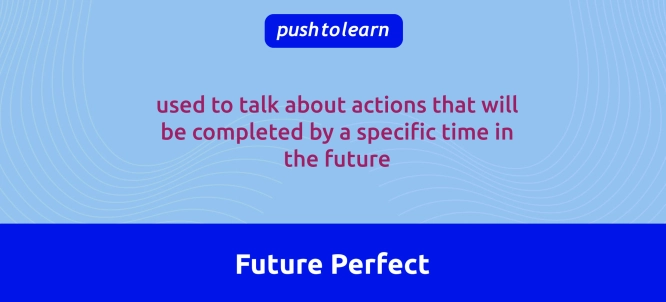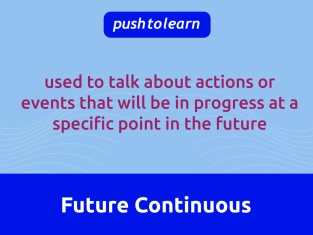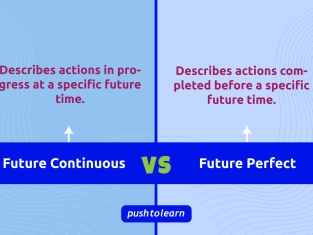by PushtoLearn
Future Perfect
Table of Contents
Future Perfect – Exercises
These exercises focus on Future Perfect
What is the Future Perfect Tense?
The Future Perfect Tense emphasizes that an action will be finished before a certain point in the future. It focuses on the completion of the action rather than its duration.
Examples:
-
By 8 PM, I will have finished my homework.
-
She will have left the office before the meeting starts.

Rules for Using the Future Perfect
Structure
To form the Future Perfect, follow this structure:
Subject + will + have + past participle (verb in the 3rd form)
|
Type of Sentence |
Structure |
Example |
|
Positive |
Subject + will + have + past participle |
I will have completed the project by 5 PM. |
|
Negative |
Subject + will not (won’t) + have + past participle |
She won’t have arrived by then. |
|
Question |
Will + subject + have + past participle? |
Will they have finished the report? |
Time Markers
The Future Perfect often uses time expressions like:
-
By (e.g., by tomorrow, by 2025)
-
Before (e.g., before noon, before the event starts)
-
In (e.g., in two years, in a week)
When to Use
-
To describe an action that will be completed by a specific time
-
By next month, I will have saved enough money for the trip.
-
He will have graduated by 2024.
-
To describe an action that will be completed before another future action
-
She will have cooked dinner before they arrive.
-
The guests will have left by the time we get home.
Common Errors
-
Forgetting to use "have" in the structure
-
Incorrect: They will finished their work.
-
Correct: They will have finished their work.
-
Using the wrong verb form
-
Incorrect: I will have finish the report.
-
Correct: I will have finished the report.
-
Confusing it with Future Continuous
-
Incorrect: By 8 PM, I will be completing my homework.
-
Correct: By 8 PM, I will have completed my homework.
-
Using "by" incorrectly
-
Incorrect: I will have left until 6 PM.
-
Correct: I will have left by 6 PM.
Everyday Uses of the Future Perfect
-
At Work
-
"By next Friday, we will have submitted the final report."
-
"Will the team have completed the project on time?"
-
At Home
-
"I will have cleaned the house before the guests arrive."
-
"They won’t have cooked dinner by the time we get home."
-
Social Situations
-
"By the time we meet again, she will have moved to another city."
-
"In two years, I will have traveled to several countries."
Comparison with Simple Future and Future Continuous
|
Future Simple |
Future Continuous |
Future Perfect |
|
Focuses on a single action in the future |
Focuses on an ongoing action in the future |
Focuses on a completed action in the future |
|
"I will finish my homework tomorrow." |
"I will be finishing my homework tomorrow." |
"I will have finished my homework by tomorrow." |
|
Often used for promises or decisions |
Often used for plans or interruptions |
Often used for deadlines or time limits |
FAQ
What is the Future Perfect Tense used for?
It is used to describe actions that will be completed before a specific time or event in the future.
How do you form a Future Perfect sentence?
Use the structure: Subject + will + have + past participle.
Can I use contractions with the Future Perfect?
Yes! For example:
-
"I’ll have finished the book by tomorrow."
-
"She won’t have arrived by the time we leave."
What is the difference between Future Perfect and Future Continuous?
The Future Perfect talks about actions that will be completed, while the Future Continuous focuses on ongoing actions.
-
Future Perfect: "I will have eaten dinner by 7 PM."
-
Future Continuous: "I will be eating dinner at 7 PM."
How do I use "by" and "before" in Future Perfect?
Use "by" to set a deadline or a specific time and "before" to refer to an earlier event.
-
"I will have finished the task by noon."
-
"She will have cleaned the room before the guests arrive."

